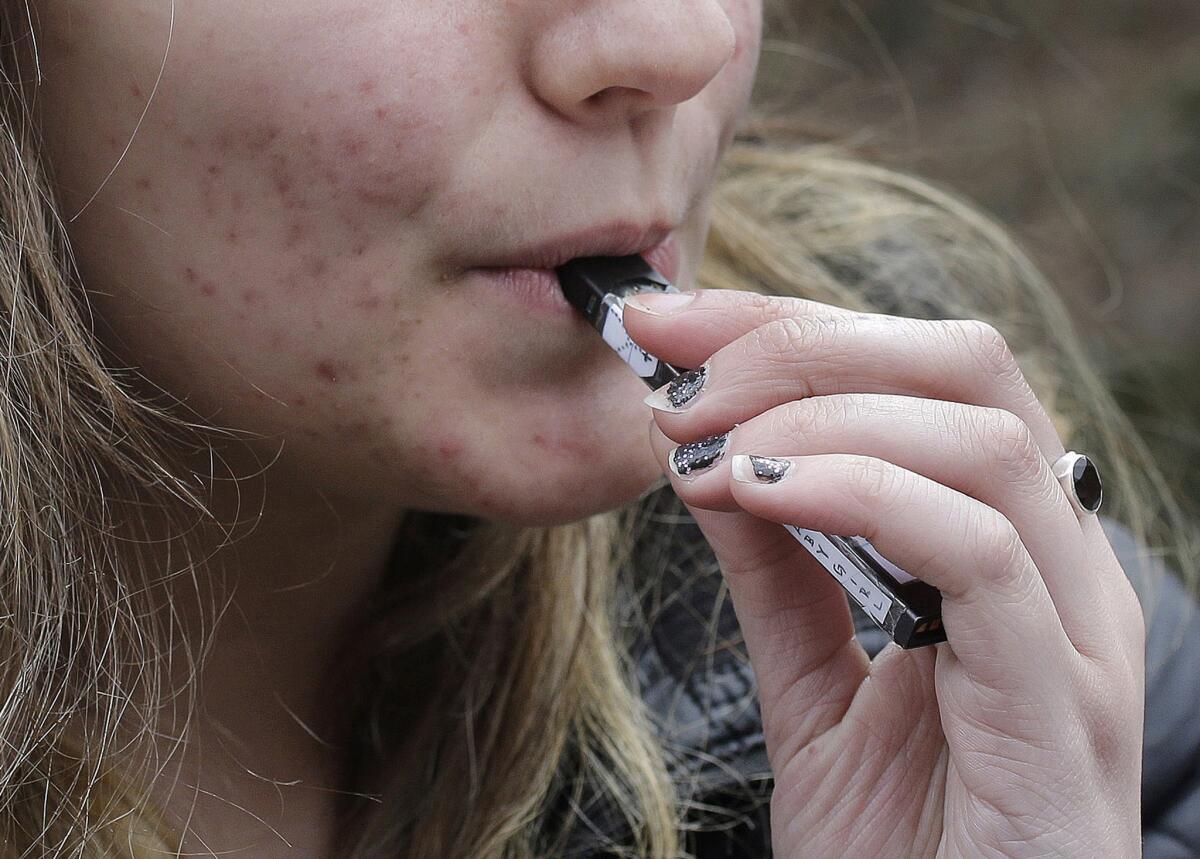California vaping bill would ban all flavored tobacco sales in stores

- Share via
SACRAMENTO — Days after concerns over youth vaping led the Trump administration to announce a partial ban on many e-cigarette pods, California lawmakers on Monday introduced a much stronger measure to outlaw store sales of all flavored tobacco products in the state.
The proposal would go far beyond the federal government’s plan, announced Thursday, for a temporary ban on many candy- and fruit-flavored e-cigarette products that could be lifted if companies can convince the U.S. Food and Drug Administration that the pods are safe. Senate Bill 793 would prohibit flavored products not covered by the federal ban, including menthol-flavored cartridges and refillable, tank-based vaping systems that can be filled with flavored chemicals. It would also outlaw flavors for traditional combustible cigarettes and cigars, as well as for chewing tobacco and hookah pipes.
The measure does not apply to products available on the Internet, including those sold by out-of-state businesses. It is supported by health and youth advocacy groups.
The legislation was announced by a bipartisan group including Democratic Lt. Gov. Eleni Kounalakis and 30 lawmakers led by Sen. Jerry Hill (D-San Mateo), who called flavored vaping products “death bait.” Other states are considering additional restrictions on flavored products, but California could become the second state to adopt a full ban should the bill become law. Massachusetts will permanently prohibit flavored tobacco sales starting in June.
“Flavored tobacco products are the gateway to nicotine addiction,” Hill said in a statement. “The tastes and aromas of candy, fruit and other popular flavors insidiously entice children, teens and others into unhealthy and potentially life-threatening habits.”
The lawmakers cited a federal study that found some 5 million middle and high school students in 2019 reported having used e-cigarettes in a recent 30-day period, an increase from 3.6 million the year before. The 2019 National Youth Tobacco Survey released by the Centers for Disease Control and Prevention and the Food and Drug Administration found nearly 1 million of the students reported daily use, and estimated that nearly two-thirds of high school students who use electronic cigarettes do so with menthol or mint flavors.
“As a mother of two teenage sons, I’ve watched the explosion of teenage vaping in my own community, as well as across the state,” Kounalakis said. “Too many of our kids are already suffering addiction to tobacco products. This flavor ban will help them break free, as well as prevent more young people from becoming addicted in the first place.”
In light of skyrocketing use, the restrictions announced by the Trump administration last week do not go far enough, said Jim Knox, managing director for the American Cancer Society, Cancer Action Network in California.
“Anything less than ridding store shelves of all flavored tobacco products, including menthol, hookah, cigars, cigarillos and chewing tobacco, diminishes the health and safety of California kids who will find a way to access flavored tobacco anywhere retailers are able to sell these alluring products,” Knox said Monday, accusing the Trump administration of abandoning a previous vow to ban more flavored vaping products.
The Vapor Technology Assn., which represents e-cigarette firms, opposes the new bill. The head of the group said the companies agree the devices should be kept away from minors.
“We know a flavor ban is simply the wrong policy — bans don’t work, they never have,” said Tony Abboud, executive director of the association. “A flavor ban will drive people back to combustible cigarettes, the leading cause of preventable death and disease in the U.S., or lead to illegal sales with a new and larger black market.”
Juul Labs Inc., which has a major share of the vaping market, has made a similar argument.
A blanket ban “would impede California’s adult smokers from accessing flavored vapor products that have been shown to help people permanently switch from cigarettes with unparalleled success,” the San Francisco firm said in a letter to lawmakers last year.
After it was confronted with public backlash to youth vaping, Juul announced last year that it would stop selling some e-cigarette products, including mint flavor, and suspended all broadcast, print and digital product advertising in the U.S.
A spokesman for Juul Labs declined to comment on the new legislation Monday, saying the company is still reviewing the bill’s language.
A similar attempt by Hill to ban all flavored tobacco products faced opposition from industry groups and was scuttled last year after other lawmakers weakened it, drawing opposition from health groups.
Assemblyman Adam Gray (D-Merced), chairman of the Assembly Governmental Organization Committee, later proposed a narrower bill that would allow flavored products to be sold at age-restricted vape and tobacco stores, and online with age-verification technology.
Gray also would have allowed e-cigarette products with menthol and mint flavors to be sold by some retailers, including liquor stores and gas stations. The assemblyman held the measure back from a vote last year to consider adding a new tax on vaping products to help pay for enforcement.
Some health groups have criticized Gray‘s proposal to allow flavored products in vaping shops, citing a recent study by the California Department of Public Health that found that 45% of tobacco and e-cigarette stores sold vaping products to researchers posing as minors.
The new legislation was announced by a coalition of lawmakers that is nearly twice the size as the one behind last year’s similar bill and includes Republican Sen. Jim Nielsen of Tehama, as well as leading Democrats including Assembly Speaker Pro Tempore Kevin Mullin of South San Francisco.
Still, the new legislation faces a challenging road at the Capitol, where the tobacco industry has held influence in the past. Juul Labs spent $388,000 last year on campaign contributions in California, including $120,000 to the state Republican Party.
The bill is the latest in a series of actions by California officials who are wrestling not only with an increase in vaping by minors, but also an outbreak of lung-related illness. The Centers for Disease Control has reported 2,561 hospitalizations and 52 deaths nationally that are believed to be tied to vaping.
In response to the health crisis, Gov. Gavin Newsom issued an executive order in September calling for state agencies to develop a plan for increased enforcement to reduce illegal vaping by underage users. Newsom also directed state officials last fall to set aside $20 million for a vaping awareness campaign. The governor declined to comment Monday on whether he would sign the new bill.
In November, California Atty. Gen. Xavier Becerra filed a lawsuit against Juul Labs alleging the vaping brand targeted young people through advertising and failed to give warnings about health risks posed by using e-cigarettes with nicotine.
State law bars the sale of vaping devices to people under 21, but the state suit alleges electronic cigarette firms made products with nicotine that appealed to young smokers by marketing flavors such as mango, cool mint, crème brûlée and cucumber.
More to Read
Sign up for Essential California
The most important California stories and recommendations in your inbox every morning.
You may occasionally receive promotional content from the Los Angeles Times.











